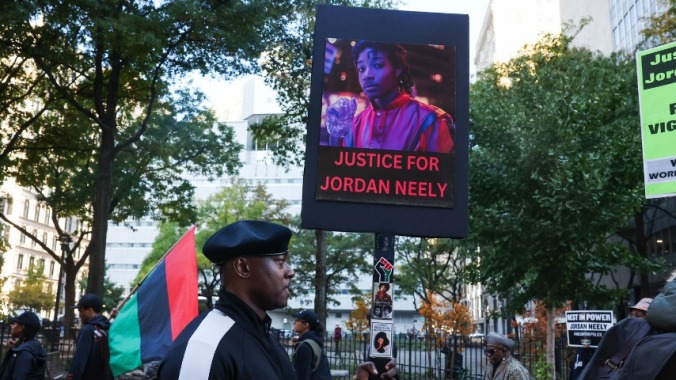Daniel Penny, Who Strangled Jordan Neely for 6 Minutes, Found Not Guilty of Strangling Him to Death
The trial caps off a horrific tragedy that quickly became a flashpoint in right-wing culture wars and panics about urban crime.
Photo: Getty Images Latest
On Monday, a Manhattan jury acquitted Daniel Penny, the 26-year-old white man who choked Jordan Neely, a homeless, unarmed Black man, to death on the subway in May 2023. Penny initially faced charges of criminally negligent homicide and second-degree manslaughter, but the manslaughter charge was dropped by prosecutors on Friday, due to a deadlocked jury. A manslaughter charge requires proof the defendant recklessly caused another person’s death, while criminally negligent homicide charges relate to serious, “blameworthy conduct,” the Associated Press notes.
The trial caps off a horrific tragedy that quickly became a flashpoint in right-wing culture wars and panics about urban crime. But if anything, we’re all clearly far less safe in a society where individuals effectively have legal permission to choke to death anyone who makes them uncomfortable in public.
On May 1, 2023, video shows that, inside a subway car, Neely shouted about being hungry and thirsty, and that he didn’t care if he died or went to jail. Penny then came up from behind Neely and put him in a chokehold. Penny sustained the chokehold for about six minutes, even when it was clear that Neely was dying, and even when the subway doors opened and passengers could safely exit. “He’s dying. Let him go!” an unseen bystander said in the background of one video captured by another passenger.
Some passengers testified that Neely made them feel nervous and unsafe. Some recounted that he didn’t approach any of them. Still, Penny told detectives he was trying to “put [Neely] out,” and that he was “just trying to keep him from hurting anyone else” and “de-escalate” the situation. His defense — and the bloodthirsty, right-wing culture warriors who have since valorized him — insisted Penny is a hero and upstanding citizen who kept his fellow riders safe. Penny’s attorneys also argued that it wasn’t even the chokehold that killed Neely, but Neely’s schizophrenia medication. Medical records from the trial show Neely used the synthetic cannabinoid K2 and told doctors that he found it could negatively affect his thinking and behavior.
Additional medical records reviewed during the trial showed that after being hospitalized for depression at 14, Neely was diagnosed with schizophrenia. He told a doctor in 2017 that his experiences with homelessness and poverty, including being forced to “dig through the garbage” for food, caused him to feel so hopeless he considered suicide. Shortly after Neely’s death, reporting came to light about his years-long struggles in the foster system, how he often gave his own money earned from street dancing to fellow foster kids for food and clothes, and how he struggled after losing his mother, whose boyfriend was convicted of murdering her.
-

-

-

-

-

-

-

-

-

-

-

-

-

-

-

-

-

-

-

-

-

-

-

-

-

-

-

-

-

-

-

-

-

-

-

-

-

-

-

-









































